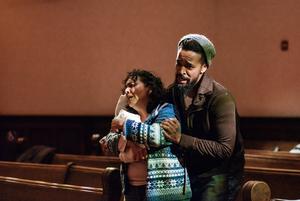Review: IN Series' L'ENFANCE DU CHRIST a TImely, In-Depth Experience of Berlioz' Brilliance

The story of Christmas has always had a special resonance, for those concerned about the poor and dispossessed. But in recent years-the last 3 years, to be precise-the plight of the refugee, as found in the story of Joseph and Mary's flight to Egypt, has come front and center. This seemingly minor event, performed (as Matthew implies) simply so that an obscure passage from Jewish scripture could be "fulfilled," has become strikingly relevant once again.
Hector Berlioz' oratorio, L'Enfance du Christ ("Christ's Infancy") is one of the most poignant and striking works you will find this holiday season. And its accusing finger, pointed directly at those who treat refugees with scorn, shoots out at the very moment when we need it the most. The time for indifference is long past, and we need to understand how all of us are complicit in what happens, both in biblical times and in our own.
Directors Steven Scott Mazzola and Timothy Nelson have created a deeply moving, broadly staged version of a piece that was originally designed for the concert hall. In moving the singers throughout the vast, acoustical gem that is the Foundry United Methodist Church, you are surrounded (literally) by actions that are as contemporary as you can possibly imagine-and imagine you will.
The action begins at the pulpit, where the Narrator - the charismatic, forceful tenor Ian McEuen - announces Jesus' birth and the threats to come. Berlioz, who wrote the libretto himself, then shifts your attention to a sleepless, haunted King Herod. This being a modern-dress production, we find bass-baritone Kerry Wilkerson in sweats, a bathrobe and slippers, unable to sleep as he sits in a cushioned chair watching his flat screen.
In Berlioz's scenario, it is the Soothsayers who advise Herod to kill every newborn child, a dark bargain indeed. But one of the many masterstrokes here is the way that Mazzola and Nelson stage what follows. For each performance, they take volunteers from the audience who perform as silent witnesses, fellow refugees and fellow victims, along with Joseph and Mary, of Herod's madness. They enter, commanded by soloists wearing ICE jackets, and carry bolts of cloth that serve as shrouds, then blankets, and then-for the Slaughter of the Innocents-they are bundled into their arms as babes. The agents proceed to seize each of these babes and dash them violently to the ground-music or no music (and the music is glorious) it's a reminder of the depths of cruelty to which we have fallen as a nation.
The central figures, the Holy Family, first appear in the choir loft, accompanied by angels whose presence is masked by a sheer curtain. Jarrod Lee's deep, sonorous turn as Joseph is absolutely riveting, and Elizabeth Mondragon makes the most of her role as Mary, who is permitted to suffer and weep throughout their long ordeal.
If you're not familiar with Berlioz' music, it might help to imagine a wunderkind raised on a healthy diet of Bach, Beethoven, and Mozart. Not content to quote directly, Hector Berlioz borrows time signatures and, jazz-like, refers you to a melody or a harmonic scheme from other masters-you'll swear you're hearing the next-gen version of the St. Matthew's Passion or The Magic Flute, but in a musical language that is entirely Berlioz' own.
Stanley Thurston leads a small ensemble through the score with grace and simplicity, working with Matthew Lynch's new orchestration, which includes the Foundry church's organ among its finer touches. Maria Bissex assembles costumes that we might find anywhere along our southern border, Yacine Fall & JEFF manage the feat of turning the entire church into a stage. Meanwhile, Marianne Meadows fills the space with light, a fractured lattice-screen projected onto the central dome and complementary shafts illuminating the pillars and pendentives. The production team has combined to create as complete an experience of Berlioz' story as you could ask for.
What I found stunning, returning to this masterpiece, was the way in which Berlioz anticipated the spirit of our own times. As Joseph and Mary knock on doors seeking shelter, they are rejected in language that sounds all too familiar; the third door brings them finally to an Egyptian, an "Ishmaelite" who welcomes them and provides a home for them for a number of years to come. Berlioz deliberately begins and ends his story with a bass soloist-often the same. So it is that Kerry Wilkerson, our onetime tortured Herod, is transformed into a humble craftsman in coveralls, welcoming the Holy Family in tones that bring Mozart's hero Sarastro to mind.
You have only one more night to catch this show, folks - to miss it would be positively sinful; Berlioz is a composer to be experienced in full, and this production of "L'Enfance du Christ" does it all.
Production Photo: Elizabeth Mondragon as Mary and Jarrod Lee as Joseph. Photo by RX Loft.
Running Time: 1 hour and 30 minutes, with no intermission, performed in English. (Librettos from an older translation are available for audience members).
The FInal Performance of L'Enfance du Christ will be on December 14 at the Foundry United Methodist Church, 1500 16th Street NW, Washington, D.C. Foundry UMC is at 16th Street & P St, three blocks East of the Dupont Circle Metro Station on the Red line, with pay parking available on P St. between 17th and 16th Sts.
For tickets, visit directly here: click here
Reader Reviews

Videos
